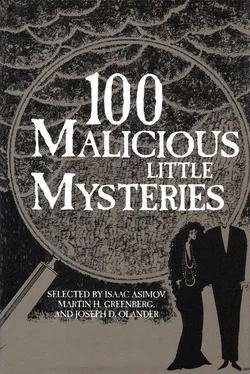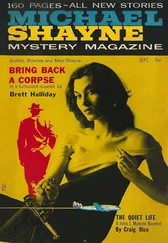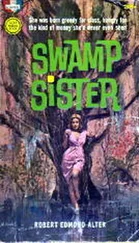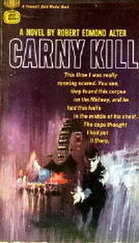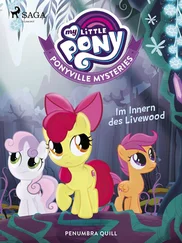She took a tiny sip from her glass. “I don’t understand.”
“Your theory,” he told her, “may be the right one.”
She leaned forward with a tiny smile of triumph. “Twisted thoughts,” she said. “Evil influences lead men to do things they would not otherwise do.”
“Twisted thoughts,” the sergeant agreed. “Of the murderer, however, rather than the victims’. There’s someone living in this building. Miss Mackey, who is very mixed up indeed.”
She watched alertly as he put down his glass and went to the window. “I hate to keep going over this,” he said, “but I have to be very sure of the facts.” He opened the window as far as it would go. “Now,” he said, “when you came into the room you saw Mr. Higgins standing there, partly hidden by the drapery. You had no idea till then that he was in the apartment.”
“That is correct,” Miss Mackey said, and the sergeant seemed to hear again his seventh-grade teacher’s voice.
“You’re sure you didn’t call Mr. Higgins in to fix a window?” he went on. “Some of your neighbors report having heard voices in the hallway minutes before Mr. Higgins fell.”
“Certainly not,” Miss Mackey said.
“When you caught sight of him, you screamed and ordered him to leave,” the sergeant went on.
“Exactly.” Miss Mackey put down her glass and came over to the window. “He seemed to panic. He crawled out on the sill, looked back over his shoulder at me, and then he fell forward and was gone.”
“Like this.” The sergeant then climbed cautiously onto the sill and crouched there, balancing himself with his fingertips. He looked back in time to see her small, reproachful face close to his shoulder, and then he felt her hands on his back, pushing with great purpose, and he was hurtling out into space.
“Like that,” he heard Miss Mackey say very closely behind him.
It was an astonishingly long way down. The sergeant thought of his Ma, and of the cheerful, sometimes ribald girls he had loved as he grew up. He saw, in kaleidoscope, the dark places of his life and the churning colors, the chronic grand disorder of being alive. When he landed, bouncing twice in the great lap of the safety net, it was as if he had resigned himself — committed himself — forever to the way things actually were.
Westerberg helped him down.
“You want to go up or should I?” he asked sympathetically.
“You go,” the sergeant said.
He waited in the dark courtyard until Westerberg had disappeared into the building. Then he straightened his coat and went around the side of the building to where the patrol car was parked. He took out his pipe. He knew they wouldn’t be down for a while. Miss Mackey would want to wash the brandy glasses and put them away, powder her nose, and close the window before she went to the station.
A Dip in the Poole
by Bill Pronzini
I was sitting in a heavy baroque chair in the Hotel Poole’s genteel lobby, leafing through one of the plastic-encased magazines provided by the management, when the girl in the dark tweed suit picked Andrew J. Stuyvesant’s pockets.
She worked it very nicely. Stuyvesant — a silver-haired old gentleman who carried a malacca walking stick and had fifteen or twenty million dollars in Texas oil — had just stepped out of one of the chrome-and-walnut elevators directly in front of me. The girl appeared from the direction of the curving marble staircase, walking rapidly and with elaborate preoccupation, and collided with him. She excused herself. Bowing in a gallant way, Stuyvesant allowed as how it was perfectly all right, my dear. She got his wallet and the diamond stickpin from his tie, and he neither felt nor suspected a thing.
The girl apologized again and then hurried off across the padded indigo carpeting toward the main entrance at the lobby’s opposite end, slipping the items into a tan suede bag she carried over one arm. Almost immediately, I was out of my chair and moving after her. She managed to thread her way through the potted plants and the dark furnishings to within a few steps of the double-glass doors before I caught up with her.
I let my hand fall on her arm. “Excuse me just a moment,” I said, smiling.
She stiffened. Then she turned and regarded me as if I had crawled out from one of the potted plants. “I beg your pardon?” she said in a frosty voice.
“You and I had best have a little chat.”
“I am not in the habit of chatting with strange men.”
“I think you’ll make an exception in my case.”
Her brown eyes flashed angrily as she said, “I suggest you let go of my arm. If you don’t, I shall call the manager.”
I shrugged. “There’s no need for that.”
“I certainly hope not.”
“Simply because he would only call me.”
“What?”
“I’m chief of security at the Hotel Poole, you see,” I told her. “What was once referred to as the house detective.”
She grew pale, and the light dimmed in her eyes. “Oh,” she said.
I steered her toward the arched entrance to the hotel’s lounge, a short distance on our left. She offered no resistance. Once inside, I sat her down in one of the leather booths and then seated myself opposite. A blue-uniformed waiter approached, but I shook my head and he retreated.
I examined the girl across the polished surface of the table. The diffused orange glow from the small lantern in its center gave her classic features the impression of purity and innocence, and turned her seal-brown hair into a cascading black wave. I judged her age at about twenty-five. I said, “Without a doubt, you’re the most beautiful dip I’ve ever encountered.”
“I... don’t know what you’re talking about.”
“Don’t you?”
“Certainly not.”
“A dip is underworld slang for a pickpocket.”
She tried to affect indignation. “Are you insinuating that I ...?”
“Oh come on,” I said. “I saw you lift Mr. Stuyvesant’s wallet and his diamond stickpin. I was sitting directly opposite the elevator, not fifteen feet away.”
She didn’t say anything. Her fingers toyed with the catch on the tan suede bag. After a moment, her eyes lifted to mine, briefly, and then dropped again to the bag. She sighed in a tortured way. “You’re right, of course. I stole those things.”
I reached out, took the bag from her and snapped it open. Stuyvesant’s wallet, with the needle-point of the stickpin now imbedded in the leather, lay on top of the various feminine articles inside. I removed them, glanced at her identification long enough to memorize her name and address, reclosed the bag and returned it to her.
She said softly, “I’m... not a thief, I want you to know that. Not really, I mean.” She took her lower lip between her teeth. “I have this... compulsion to steal. I’m powerless to stop myself.”
“Kleptomania?”
“Yes. I’ve been to three different psychiatrists during the past year, but they’ve been unable to cure me.”
I shook my head sympathetically. “It must be terrible for you.”
“Terrible,” she agreed. “When... when my father learns of this episode, he’ll have me put into a sanatorium.” Her voice quavered. “He threatened to do just that if I ever stole anything again, and he doesn’t make idle threats.”
I studied her. Presently, I said, “Your father doesn’t have to know what happened here today.”
“He... he doesn’t?”
“No,” I said slowly. “There was no real harm done, actually. Mr. Stuyvesant will get his wallet and stickpin back. And I see no reason for causing the hotel undue embarrassment through the attendant publicity if I report the incident.”
Her face brightened. “Then... you’re going to let me go?”
Читать дальше
